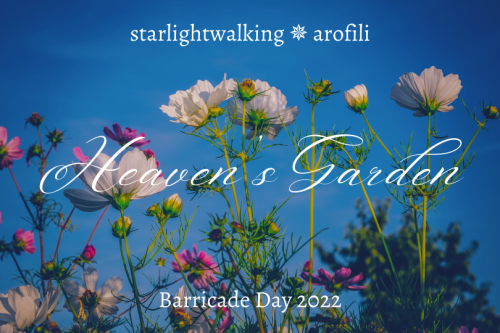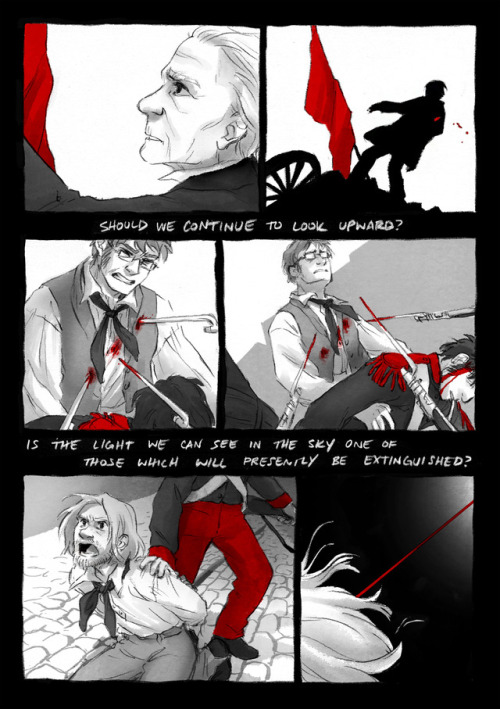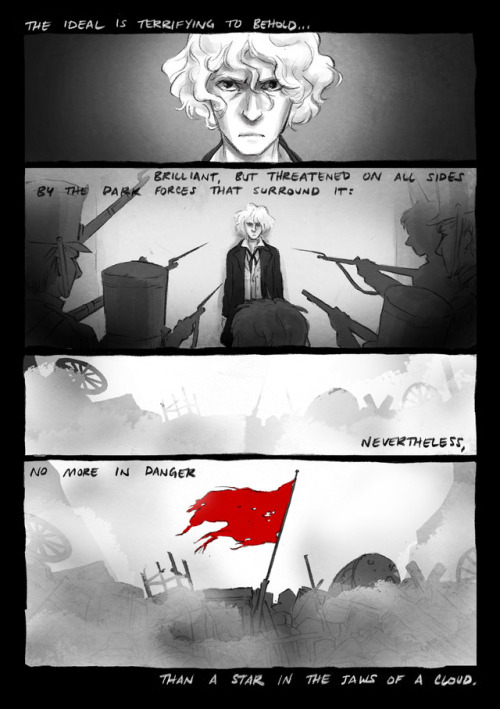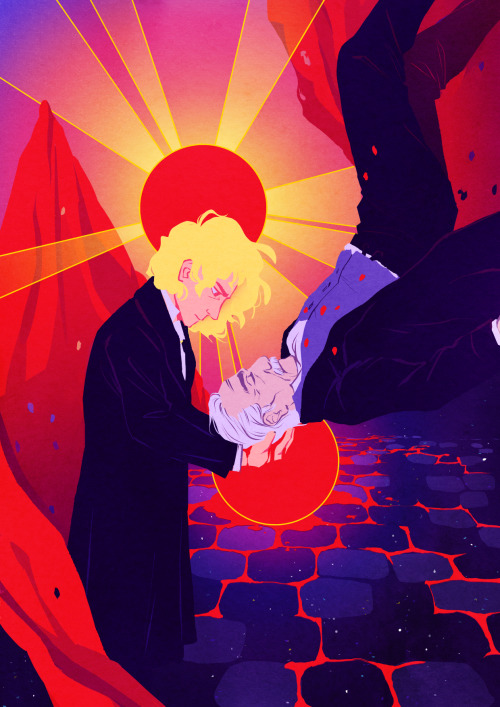#mabeuf
actually has anyone written fanfic where Valjean and Mabeuf meet and get to be Gardening Buddies and nothing horrible happens and no one has to die on a furniture wall
Heaven’s Garden
In the gardens of heaven, Fauchelevent waits.
Happy Barricade Day!! I’m only a little bit late :)
this fic is also very much inspired by the @breadandbarricadespodcast!
Rating:G | No Archive Warnings Apply
Relationships: Fauchelevent and Jean Valjean (ambiguous), Fauchelevent & Bishop Myriel, Fauchelevent & Georges Pontmercy, Fauchelevent & Mabeuf, Fauchelevent & Javert
Characters: Fauchelevent, Bishop Myriel, Georges Pontmercy, Mabeuf, Javert
Word count: 1.9k
Post link
“This barricade is made neither of paving stones, nor of timbers, nor of iron; it is made of two mounds, a mound of ideas and a mound of sorrows. Here misery encounters the ideal. Here the day embraces the night, and says: I will die with you and you will be born again in me."
Happy Barricade Day 2020
Post link
Enjolras had noticed the old man who had joined them at Rue Lesdiguières almost immediately: his white hair and uneven walk had made him stand out even in the ragtag group they had gathered over the course of their march from the other side of the river; and his silent vigil at the wineshop counter, once they had secured their position on rue de la Chanvrerie, had drawn the concerned attention of more than one insurgent. However, Courfeyrac had seemed to know him, had been speaking to him, so Enjolras was quite sure that the old man’s choice to remain with them had been made in full knowledge of their intentions and the danger such choices presented. If he refused to withdraw, even after being urged to do so several times, it was only to be assumed he was quite firm in his convictions, whatever they were.
As for the rumors he had heard passed on in whispers during the march and the construction of the barricade… well, that a member of Convention, particularly one who had voted for the king’s death, could live in Paris, unknown and undisturbed, defied credulity; and the idea that he was a scepter of one of those great men, coming back to exact justice for his fallen Republic, even more so. But the awareness of the facts had done little to deter insurgents in desperate need for hope and inspiration and Enjolras couldn’t see any sense in trying to shut down such speculations. After all, the spirit of 1793 reached far beyond the handful of men who had wielded power on the convention floor, and there was nothing to scorn in a support of any man who had served as an eyewitness to that great and terrible epoch.
But a regicide or not, a scepter or not, there were some things owed by the young and hale to the old and frail, in this place of fraternity more than anywhere else. Their freshly minted barricade was as prepared for an attack as they could make it. The red flag was secured on an ombnibus pole, illuminated by the torchlight in a mournful prediction of inevitable bloodshed. Enjolras checked and rechecked all the defenses, before quietly asking Combeferre to take over the guard duty for a few minutes and made his way inside the wineshop, where Jean Prouvaire had taken it upon himself to keep the spirits up.
The old man sat alone at the counter, seeming completely unaware of his surroundings. Enjolras approached slowly, taking care not to startle the man. He stood beside the counter for a moment: when no acknowledgement of his presence seemed to be forthcoming, he seated himself and waited, until eventually it seemed to him that something had flickered in the older man’s expression.
“Is there anything you need, citizen?” he asked, taking care to keep his voice quiet. “We’re already out of food, I’m afraid, but there is wine, or water if you prefer.”
Slowly, very slowly did the white head rise for a fraction and the pair of watery blue eyes, dulled with unspeakable grief, met his own. The old man shook his head slowly, before lowering his glance. For a moment it seemed that was going to be his only response, but eventually the man spoke, his voice thin and soft, with a hint of bewilderment underlying the obvious pain.
“I’m terribly sorry, but I’m afraid there is nothing anyone here can do for me,” he said, then hesitated for a moment, as his voice took on a tone of pained confession. “Not any more. I have sold all my books. You see?”
“I see,” Enjolras confirmed, honestly enough. The exact circumstances of the old man’s tribulations were unknown to him, but the tone of his loss, the confused pain of grief was all too common; something he had heard several times over this day of insurgency and weeks, months, beforehand. We had to sell every-thing we had. Our home, they took it. They took our jobs. Our freedom to speak, to gather. Our words, our works, our dignity, our lives, our freedom, they took it all.
“I sold them all, one by one.” The sense of urgency in the old man’s voice now would have seemed impossible even a minute ago. The words blurred into each other, tumbling out with uneven speed, as if a great dam had been unleashed. “My own Flora of the Environs of Cauteretz, my life’s work. I sold the texts as waste paper and pawned the plates. They were sold to some copper-smith, who melted them down for stewpans.” Enjolras winced. “Then I sold my other books – Les Quadrins Historiques de la Bible, edition of 1560; president Delancre's De l’Inconstance des Démons;Florilegium Rabbinicum of 1644; a Tibullusof 1567 – all of them rare copies, for twenty or thirty sous a piece – but what can you do? Then my Diogenes Laertius ” His voice broke a little. “I never meant to sell it at all. What difference does it make, to die now with one book, or in a few weeks with none at all? But my poor Mother Plutarque… My poor mother Plutarque was terribly ill, so I sold it. I brought her the money and the medicine. Then I came here.” He fell silent for a moment, his eyes suddenly focusing on Enjolras, as if truly noticing his presence for the first time. “Books are important,” he whispred, his voice low and urgent and for a moment it seemed to Enjolras that he truly carried the full weight of the old Republic in his words. “But people are important too.”
Enjolras could only nod, unable to bring himself to say anything that might break this moment of great clarity.
Nevertheless, the old man seemed to lose some of his urgency, but he remained far more focused on his surroundings, looking around the tavern room and through the open door, with something almost like curiosity. “Is this why you are all here?” he asked, gesturing towards the general direction of the greater barricade “For the people?”
“For the people, always,” Enjolras answered and thought of Combeferre’s fervor on the subject of general education, of Feuilly spending his rare free hours making the best use of his hard-won literacy. Of his own uncle, the way his brow furrowed when yet another censorship law chipped away on what little freedom they had gained from the last revolution. Of the pamphlets printed in the dead of night and passed around in secret, of Jean Prouvaire and his words echoing even now between them, in this moment of silence Et que, dans notre humble et petit ménage,Tout, même l’hiver, nous était printemps? “and perhaps a little for the books too.” For the abaissé and for the ABC.
Perhaps… if they all survived this fight, something could be done for the old man and his lost books. He hesitated from bringing up the possibility - after all, the books might very well be gone forever, and it would be both foolish and cruel to offer false hope before investigating fist. But Enjolras wasn’t fighting for a future that would forget the little tragedies of its champions the moment it didn’t need every available body to man the barricades. He would at least try.
The old man was looking at him with something akin of wonder, as if he hadn’t been expecting such answer. “And indeed why not,” he mused. “People have a need of books, to be sure. What about gardens,” he asked, suddenly. “Will there be gardens in this future of yours? It is well not to starve, but the people have a need for flowers.”
Enjolras gaze wandered back to Jean Prouvaire, thinking about the pot of flowers his friend had inexplicably decided to bring with him to the barricade, now tucked safely under the main table, out of the way of the construction efforts and fighting.
Nos jardins étaient un pot de tulipe;
Tu masquais la vitre avec un jupon;“Yes,” he admitted, biting back a smile at the literal nature of this promise. “We fight for flowers too.”
The old man smiled suddenly, a fleeting expression tinged with melancholy, but genuine, and touched with wonder and something akin of hope. “This future of yours, my friend, sounds the most splendid.”
“Our future,” Enjolras answered. “And yes. It will be.”
The other shook his head, knowingly. “I won’t hold you to that. But the rest of it, yes. People and books and flowers. Yes.” His gaze turned back to the tabletop, lost in thought. He said no more.
(Yes, the Bread and Roses reference is intentional. So is the reference to the mômes in Luxembourg. Prouvaire’s Battle Plant comes, of course, from the Oslo production of Les Mis.)
Hello, I made a Uquiz: “Which hot Les Mis dad should You date?”
It’s a Uquiz that dares to ask the question: what if Les Miserables was a dream-daddy style dating sim? Who would you end up with? A dilf like Valjean and Georges or a rat man like Thenardier? A thorough and brick-accurate quiz with nearly a dozen possible options, by the end of it you will know you Really would date!




